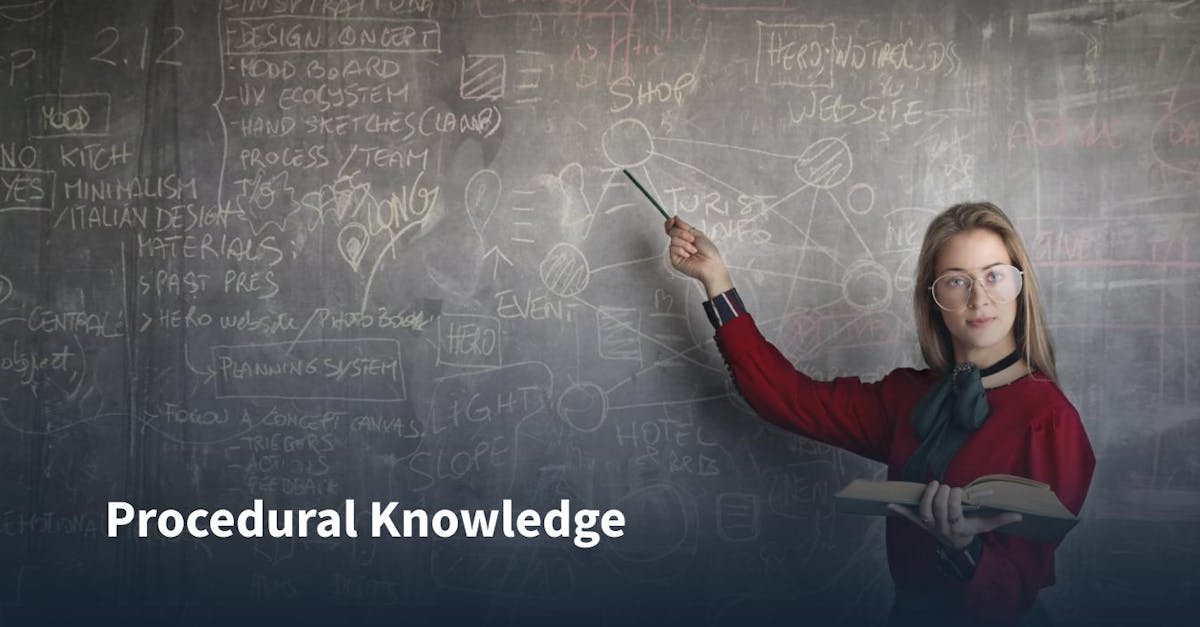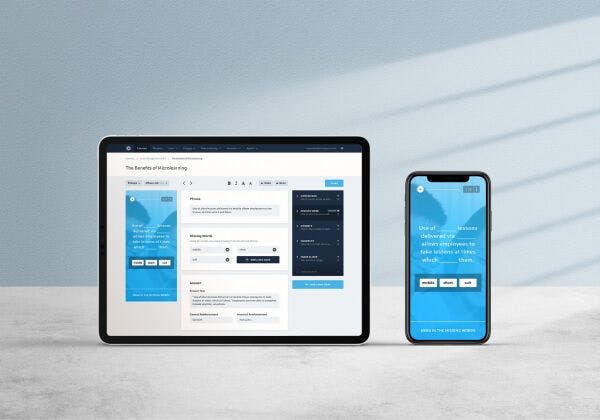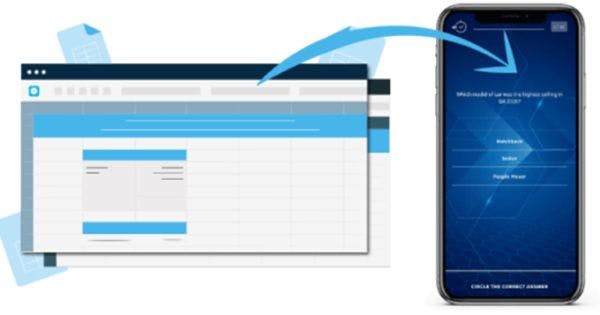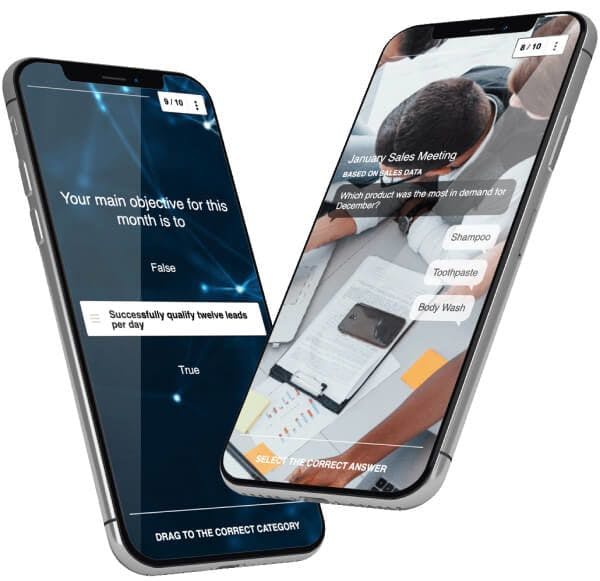Procedural Knowledge

Found within the context of knowledge management, procedural knowledge is a type of knowledge exercised for the execution of a certain skill or task. To put it simply, it refers to know-how knowledge. It’s about having a sound understanding of the how-tos of a certain situation and the ability to actually do or perform it.
In this article, we’ll unpack the deeper meaning of procedural knowledge, its examples, and how organizations and learners can benefit from this type of knowledge. We’ll also explore some trainer tips and techniques that can help you successfully pass on procedural knowledge to your employees.
What is Procedural Knowledge?
Procedural knowledge comes from the root word “procedure”, defined as the knowledge of knowing the procedures of something. Having substantial procedural knowledge means having the ability to exercise specific action to solve a problem or perform a task.

The acquisition of procedural knowledge is commonly linked to the development of explicit or declarative knowledge. As compared to procedural knowledge, declarative knowledge focuses on the “what” instead of the ‘how’ or ‘why’ of certain things. Basically, it’s about having factual knowledge of something.
Procedural knowledge usually needs time and practice to master, unlike declarative knowledge that can be learned rapidly. Think about learning how to drive a car. Declarative knowledge means you know the driving rules and road signs, and you can technically learn it in just a short amount of time. Meanwhile, having procedural knowledge indicates that you know how to physically drive your car and follow the road signs. This knowledge, however, can only be obtained after constant practice. The more you drive, the better you get at this skill.
Examples of Procedural Knowledge
Now that we’ve defined procedural knowledge, let’s take a look at how it’s commonly used in various applications:
Procedural knowledge in AI applications typically involves an intelligent agent or robot that has been programmed to perform and complete specific tasks. One good example is a navigation system showing you the pathways to a specific location. A descriptive-based system will only give you a typical map, but a procedural-based technology will guide you with a step-by-step procedure on how to navigate the room.
In the context of intellectual property or IP, procedural knowledge refers to tightly held information that is usually about how something is made, done, or used. After all, simply knowing every technical thing about a product is potentially useless unless you know how to use them. Holding an extremely high value, procedural knowledge in an IP is usually sealed by a “right-to-use” license. The unauthorized release of this information is illegal and punishable.
In cognitive psychology, procedural knowledge can be realized as non-conscious knowledge that can’t be articulated. Say you found a specific joke as “funny”, but you can’t explain the process of how you’ve arrived at this decision. It shows the notion of knowing how, although it can’t be explained easily because the knowledge has been attained unconsciously.
In organizations, procedural knowledge is frequently manifested in organizational processes and practices. Employees equipped with this type of knowledge are seen to be more independent and trustworthy, and they induce more favorable outcomes. With substantial knowledge about the ins and outs of this process, you will no longer have to supervise them when performing their tasks. This, in turn, can help you save an incredible amount of time, money, and resources in the long run. Just think of a seasoned employee working at a company for years now. After working on his/her task a handful of times, he/she has already developed competency and procedural knowledge, requiring little to no supervision moving forward.

While an employee who learns how to do this may be efficient on their own, it’s important to consider documenting this process for future reference. This can be done by tapping knowledgeable employees who can create some sort of manual outlining the different steps and even including practical tips in a way that can be easily understood even by those new to it. This way, they don’t always have to reach out to their co-workers just to find out how to get things done as it’s all available for everyone to access anytime.
Having everyone on board with developing a work culture that values procedural knowledge will help you succeed in passing on this information. Having this mindset will then greatly productivity and efficiency which will help reach organizational goals.
How to leverage Procedural Knowledge in your organization?
Here’s how you can leverage the procedural knowledge in your organization and build high-performing teams:
Examine your business procedures in detail to see where your people are currently having difficulties. You can bring your team together to gather their input and feedback on certain projects or goals, and find what aspects they are generally confused about. From there, appoint the most experienced employee to explain the procedures to their colleagues.
It is also a good idea to compile a list of the most common pain points of your business procedural knowledge, and then record a step-by-step guide that will help them understand the process. Make sure to store your procedural information in a centralized database where your employees can easily access them. This way, your team will always be armed with procedural knowledge whenever and wherever they need it.
Overcome the one-expert trap and make your corporate learning and procedural knowledge base open for collaboration. Rather than depending on a single person, give everyone on your team an equal chance to demonstrate a specific task and share their recommendations for getting things done faster and more efficiently. This dynamic permits the procedural information to flow seamlessly among your workforce, resulting in increased innovation and profitability.

How to improve Procedural Knowledge sharing?
Below, you’ll find a number of proven techniques that will help boost your organization’s procedural knowledge and embed it within your learning activities or learning programs.
Knowledge management tools make the transfer and sharing of business knowledge quick and straightforward, absolving you of all the fuss of jumping from one learning software to another. They streamline organizational data and processes in a single repository, making it easier for your employees to collect and retrieve procedural information whenever they need it. As a result, you’ll enjoy increased employee efficiency and a healthier business bottom line.
EdApp SAAS makes one of the most trusted knowledge management tools in the learning & development industry today. From training content development to knowledge gap analysis and tracking, this LMS platform has everything you need to make the process of compliance training and procedural knowledge transfer within your organization a breeze. Powered by cloud-based technology, EdApp also ensures that your procedural knowledge is safe and secure and that it will never be lost along the way.

You may also scan our list of Knowledge Management Tools to find and compare other knowledge management tool vendors.
Microlearning is the practice of breaking down employee training content into topical, bite-sized chunks. Basically, you can present a specific topic or lesson in only 5 to 10 minutes. By making your procedural knowledge easier to digest, the likelihood of better knowledge retention, recall, and engagement also increases.
There are several content management platforms that can transform your procedural knowledge into engaging microlearning modules in just a few clicks. EdApp, for example, has over 80+ drag-and-drop microlearning templates that are ready to be populated by your learning development content. There’s no coding and design expertise needed. All you need to do is bring your business procedural knowledge, tweak and rebrand as needed, and hit publish.

Deploying quizzes and skill assessments can also help improve procedural knowledge sharing in your organization. This strategy will help you check if your employees have successfully retained your business procedures and information. It also serves as a great opportunity to determine knowledge gaps and address them as soon as possible.
Thanks to the advancement of digital learning technology, setting up your online training and quizzes is no longer a pain in the neck. EdApp’s Rapid Refresh tool is an online test maker that can turn your content into well-designed assessments without requiring a lot of technical effort on your part. You can even specify a schedule for when the quizzes will be delivered. This LMS software also boasts a range of interactive elearning gamification templates, allowing you to gamify your assessments and present them like smartphone games. When corporate training becomes more fun and not just another work task that must be completed, it puts your employees in the best position to learn.

Give your employees the ultimate flexibility to access your organization’s procedural knowledge by making it easily accessible through mobile devices. These pocket-sized devices will allow your employees to learn on the go and access your business information wherever they are, whether they’re having a quick coffee break or riding a bus on their way home.
Shifting from traditional knowledge transfer to mobile learning may seem a little daunting for others, but it doesn’t have to be that way. Mobile training apps like EdApp feature a user-friendly authoring tool that can help you transfer your business’ procedural knowledge into a series of short modules that will respond perfectly on mobile devices. You can even leverage their push notification system to inform your team of new lessons or knowledge updates.

Signing up with EdApp is free, so there’s no excuse not to try their knowledge management features today!
Author
Jeanellie Avelino
Jen is a learning expert at EdApp, a mobile-based training platform that helps corporates and businesses bring their training solutions to the next level. She carries an extensive writing experience in a variety of fields, including architecture, the gig economy, and computer software. Outside of work, she enjoys her free time watching her favorite series and documentaries, reading motivational books, and cross-stitching.
